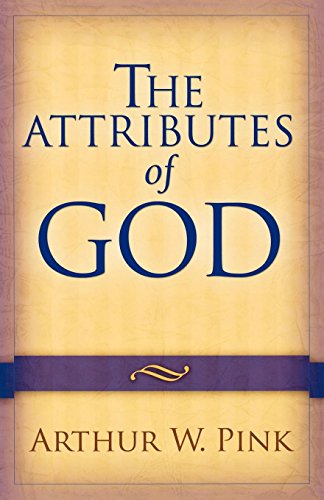
Quotes by A.W. Pink
“Great is our Lord, and of great power: His understanding is infinite” (Ps. 147:5). God not only knows whatsoever has happened in the past in every part of His vast domains, and He is not only thoroughly acquainted with everything that is now transpiring throughout the entire universe, but He is also perfectly cognizant of every event, from the least to the greatest, that ever will happen in the ages to come. God’s knowledge of the future is as complete as is His knowledge of the past and the present, and that, because the future depends entirely upon Himself. Were it in anywise possible for something to occur apart from either the direct agency or permission of God, then that something would be independent of Him, and He would at once cease to be Supreme.
The Attributes of God, Baker Book House, p. 19.
Get this book!
He cannot change for the better, for He is already perfect; and, being perfect, He cannot change for the worse.
The Attributes of God, Baker, p. 37.
Get this book!
When the solemn and blessed subject of Divine foreordination is expounded, when God’s eternal choice of certain ones to be conformed to the image of His Son is set forth, the Enemy sends along some man to argue that election is based upon the foreknowledge of God, and this “foreknowledge” is interpreted to mean that God foresaw certain ones would be more pliable than others, that they would respond more readily to the strivings of the Spirit, and that because God knew they would believe, He, accordingly, predestinated them unto salvation. But such a statement is radically wrong. It repudiates the truth of total depravity, for it argues that there is something good in some men It takes away the independency of God, for it makes His decrees rest upon what He discovers in the creature It completely turns things upside down, for in saying God foresaw certain sinners would believe in Christ, and that because of this, He predestinated them unto salvation, is the very reverse of the truth. Scripture affirms that God, in His high sovereignty, singled out certain ones to be recipients of His distinguishing favors (Acts 13:48), and therefore He determined to bestow upon them the gift of faith. False theology makes God’s foreknowledge of our believing the cause of His election to salvation; whereas, God’s election is the cause, and our believing in Christ is the effect.
The Attributes of God, Baker Book House, p. 23.
Get this book!
God foreknows what will be because He has decreed what shall be. It is therefore a reversing of the order of Scripture, a putting of the cart before the horse, to affirm that God elects because He foreknows people. The truth is, He “foreknows” because He has elected. This removes the ground or cause of election from outside the creature, and places it in God’s own sovereign will.
The Attributes of God, Baker Book House, p. 26.
Get this book!
Everything about God is great, vast, incomparable. He never forgets, never fails, never falters, never forfeits His word. To every declaration of promise or prophecy the Lord has exactly adhered, every engagement of covenant or threatening He will make good.
The Attributes of God.
Get this book!
God is true. His Word of Promise is sure. In all His relations with His people God is faithful. He may be safely relied upon. No one ever yet really trusted Him in vain. We find this precious truth expressed almost everywhere in the Scriptures, for His people need to know that faithfulness is an essential part of the Divine character. This is the basis of our confidence in Him.
The Attributes of God.
Get this book!
There are seasons in the lives of all when it is not easy, no not even for Christians, to believe that God is faithful. Our faith is sorely tried, our eyes bedimmed with tears, and we can no longer trace the outworkings of His love. Our ears are distracted with the noises of the world, harassed by the atheistic whisperings of Satan, and we can no longer hear the sweet accents of His still small voice. Cherished plans have been thwarted, friends on whom we relied have failed us, a profest brother or sister in Christ has betrayed us. We are staggered. We sought to be faithful to God, and now a dark cloud hides Him from us. We find it difficult, yea, impossible, for carnal reason to harmonize His frowning providence with His gracious promises.
The Attributes of God.
Get this book!
Unspeakably solemn is it to see so many abusing this Divine perfection. They continue to despise God’s authority, trample upon His laws, continue in sin, and yet presume upon His mercy. But God will not be unjust to Himself. God shows mercy to the truly penitent, but not to the impenitent (Luke 13:3). To continue in sin and yet reckon upon Divine mercy remitting punishment is diabolical. It is saying, “Let us do evil that good may come,” and of all such it is written, whose “damnation is just” (Rom. 3:8).
The Attributes of God.
Get this book!
It is sad to find so many professing Christians who appear to regard the wrath of God as something for which they need to make an apology, or at least they wish there were no such thing. While some would not go so far as to openly admit that they consider it a blemish on the Divine character, yet they are far from regarding it with delight, they like not to think about it, and they rarely hear it mentioned without a secret resentment rising up in their hearts against it.
The Attributes of God, chapter 16.
Get this book!
Indifference to sin is a moral blemish, and he who hates it not is a moral leper. How could He who is the Sum of all excellency look with equal satisfaction upon virtue and vice, wisdom and folly? How could He who is infinitely holy disregard sin and refuse to manifest His “severity” (Rom. 9:12) toward it? How could He who delights only in that which is pure and lovely, loathe and hate not that which is impure and vile? The very nature of God makes Hell as real a necessity, as imperatively and eternally requisite as Heaven is. Not only is there no imperfection in God, but there is no perfection in Him that is less perfect than another.
The Attributes of God, chapter 16.
Get this book!
The wrath of God is His eternal detestation of all unrighteousness. It is the displeasure and indignation of Divine equity against evil. It is the holiness of God stirred into activity against sin.
The Attributes of God, chapter 16.
Get this book!
A study of the concordance will show that there are more references in Scripture to the anger, fury, and wrath of God, than there are to His love and tenderness. Because God is holy, He hates all sin; And because He hates all sin, His anger burns against the sinner: Psalm 7:11.
The Attributes of God, chapter 16.
Get this book!
Our readiness or our reluctancy to meditate upon the wrath of God becomes a sure test of our hearts’ true attitude toward Him. If we do not truly rejoice in God, for what He is in Himself…then how dwelleth the love of God in us?
The Attributes of God, chapter 16.
Get this book!
The fact is that “foreknowledge” is never used in Scripture in connection with events or actions; instead, it always has reference to persons. It is persons God is said to “foreknow,” not the actions of those persons.
The Attributes of God, Baker Book House, p. 24.
Get this book!
There is only one safeguard against error, and that is to be established in the faith; and for that, there has to be prayerful and diligent study, and a receiving with meekness the engrafted Word of God.
The Attributes of God, Baker, p. 22.
Get this book!
The prevailing idea seems to be, that I come to God and ask Him for something that I want, and that I expect Him to give me that which I have asked. But this is a most dishonouring and degading conception. The popular belief reduces God to a servant, our servant: doing our bidding, performing our pleasure, granting our desires. No, prayer is a coming to God, telling Him my need, committing my way unto the Lord, and leaving Him to deal with it as seemeth Him best.
The Lord’s commands are rarely accompanied with reasons but they are always accompanied with promises, either expressed or understood.
Gleanings in Genesis, Moody Press, 1950, p. 142.
Get this book!
[It is] not that faith is accepted by God in lieu of righteousness as an equivalent for righteousness, else would faith be a meritorious thing, but that faith is the recipient of that righteousness by which we are justified.
Gleanings in Genesis, Moody Press, 1950, p. 167.
Get this book!
It is when we have received some special mark of the Lord’s favor, or immediately after we have enjoyed some unusual season of communion with Him, that we need most to be on our guard!
Gleanings in Genesis, Moody Press, 1950, p. 174.
Get this book!
The measure of our love for others can largely be determined by the frequency and earnestness of our prayers for them.
No sinner was ever saved by giving his heart to God. We are not saved by our giving, we are saved by God’s giving.
Most Christians expect little from God, ask little and therefore receive little and are content with little.
- « Previous
- 1
- 2


